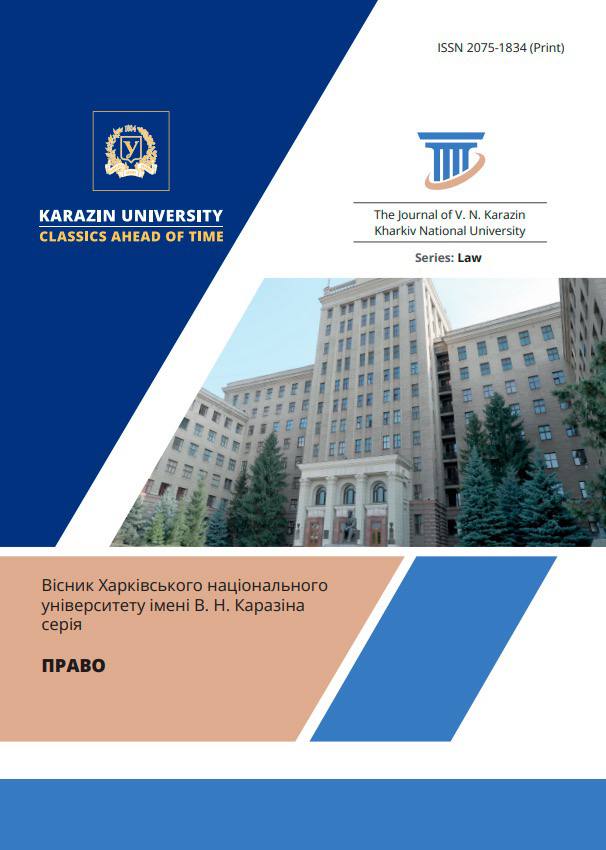PARTICULARS OF PURCHASING MEMORIES CULTURAL HERITAGE
Abstract
Introduction. An extremely important role in the formation of Ukraine as an independent European state is played by raising the level of cultural self-awareness of its citizens, and a separate link in this process is occupied by the proper legislative regulation of the exercise of ownership of cultural heritage sites. The analysis of legal acts regulating the legal status and circulation of monuments of cultural heritage shows a certain fragmentation, inconsistency and the presence of conflicts. To date, the problem of legal regulation of certain aspects of the termination of the right to ownership of cultural heritage sites is quite relevant also in the doctrinal aspect. The insufficient number of individual special studies of cultural heritage monuments as objects of property rights in civil science indicates a correlative relationship with the corresponding legislative uncertainty and at the same time emphasizes the urgent practical significance of such theoretical studies. The purpose of the research is to find out the peculiarities of the purchase of monuments of cultural heritage.
Summary of the main results of the study. Since the legislator uses the term «owner» in the relevant article of the Central Committee, and the Law of Ukraine «On the Protection of Cultural Heritage» also does not contain a direct reference to the right of private ownership, but, on the contrary, indicates that monuments can be in state, communal and private property, it was concluded that forced redemption is possible not only of monuments that are under private ownership. Attention is focused on the fact that a lawsuit can be filed only against the owner of a cultural heritage site, not its owner or user, and the need to prove a cause-and-effect relationship between the actions or inaction of the owner of a cultural heritage site and its damage is indicated or destruction. In turn, the body for the protection of cultural heritage must argue and justify the existence of an urgent need for which a claim for the redemption of a cultural heritage monument is filed without warning its owner.
Conclusion. Today, there is some uncertainty in the legal regulation of relations, the object of which are cultural heritage monuments. The analysis of the main aspects of the specified grounds for the termination of the right of ownership allows us to assert the presence of «interpenetration» of the norms of private and public law, since the dispositive method of legal regulation inherent in civil law concerns only certain aspects of the circulation of monuments of cultural heritage, for example, the grounds for acquiring the right to own them. Instead, the imperatives of public law to a greater extent apply to legal relations, the object of which are monuments of cultural heritage, in particular, when it comes to their redemption - the very coercive nature of such redemption, determination of the redemption price by a court decision if the parties do not reach an agreement, etc.
Downloads
References
/References
Цивільний кодекс України. Офіційний вісник України. 2003. № 11 (28.03.2003). Ст. 461.
Менська О. А. Культурна спадщина як об’єкт цивільних прав : автореф. дис ... канд. юрид. наук. Київ, 2015. 24 с.
Зверховська В.Ф. Культурні цінності як об’єкти цивільних прав: дисс. ... канд. юрид. наук: 12.00.03. Одеса, 2015. 212 c.
Про охорону культурної спадщини: Закон України від 08.06.2000 р. № 1805–III. Відомості Верховної Ради України. 2000. № 39. Ст. 333.
Менська О. А. Культурна спадщина як об’єкт цивільних прав: дис ... канд. юрид. наук. 12.00.03. Київ, 2015. 231 с.
Цивільний кодекс України: Науково-практичний коментар (пояснення, тлумачення, рекомендації з використанням позицій вищих судових інстанцій, Міністерства юстиції, науковців, фахівців). Т. 5: Право власності та інші речові права. За ред. проф. І. В. Спасибо-Фатєєвої. Серія «Коментарі та аналітика». Х.: ФО-П Лисяк Л. С., 2011. 624 с.
Великий тлумачний словник сучасної української мови : 250000 / уклад. та голов. ред. В. Т. Бусел. Київ; Ірпінь: Перун, 2005. VIII, 1728 с.
Про місцеве самоврядування в Україні. Закон України. Офіційний вісник України. 1997. № 25. стор. 20.
Методика грошової оцінки пам’яток, затверджена Постановою Кабінету Міністрів України від 26.09.2002 № 1447. Офіційний вісник України. 2002 р., № 39, стор. 82, стаття 1828.
Civil Code of Ukraine. Official Gazette of Ukraine. 2003. No. 11 (March 28, 2003). Art. 461. (in Ukrainian).
Menska O. A. (2015). Cultural heritage as an object of civil rights: autoref. thesis ... candidate law of science Kyiv. 24 p. (in Ukrainian).
Zverkhovska V.F. (2015). Cultural values as objects of civil rights: diss. ... candidate law Sciences: 12.00.03. Odesa, 212 p. (in Ukrainian).
On the protection of cultural heritage: Law of Ukraine dated June 8, 2000 No. 1805–III. Information of the Verkhovna Rada of Ukraine. 2000. No. 39. Art. 333. (in Ukrainian).
Menska O. A. (2015). Cultural heritage as an object of civil rights: dissertation ... candidate. law of science 12.00.03. Kyiv. 231 p. (in Ukrainian).
Civil Code of Ukraine: Scientific and practical commentary (explanations, interpretations, recommendations using the positions of higher courts, the Ministry of Justice, scientists, experts) (2011). T. 5: Ownership and other property rights. Under the editorship Prof. I. V. Spasibo-Fateeva. Commentary and Analytics Series. Kh.: FO-P Lysiak L. S. 624 p. (in Ukrainian).
Large explanatory dictionary of the modern Ukrainian language (2005). 250,000 / comp. and heads ed. V. T. Busel. Kyiv; Irpin: Perun. VIII, 1728 p. (in Ukrainian).
About local self-government in Ukraine. Law of Ukraine. Official Gazette of Ukraine. 1997. No. 25. p. 20. (in Ukrainian).
Methodology of monetary valuation of monuments, approved by Resolution of the Cabinet of Ministers of Ukraine dated 09/26/2002 No. 1447. Official Gazette of Ukraine. 2002, No. 39, p. 82, article 1828. (in Ukrainian).
Copyright (c) 2024 Олена Устименко

This work is licensed under a Creative Commons Attribution 4.0 International License.




